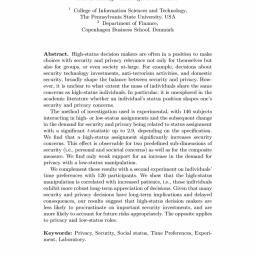
New research
(abstract) suggests that those in higher-level positions are
more likely to make decisions that value security over privacy, and be more determined to carry out those decisions. In one experiment, people who were appointed supervisors showed a significant increase in their concern for security. The researchers also found that participants who were assigned a worker-level status expressed higher concern for privacy, but not significantly higher.
We find that a high-status assignment significantly increases security concerns. This effect is observable for two predefined sub-dimensions of security (i.e., personal and societal concerns) as well as for the composite measure. We find only weak support for an increase in the demand for privacy with a low-status manipulation.
[Ed. note: that would explain why your boss is always more conservative/risk averse than you'd like. Maybe the perks and salary are too good to give up, so he'll do anything to stay where he is? In which case: let's pay them less.]
 New research (abstract) suggests that those in higher-level positions are more likely to make decisions that value security over privacy, and be more determined to carry out those decisions. In one experiment, people who were appointed supervisors showed a significant increase in their concern for security. The researchers also found that participants who were assigned a worker-level status expressed higher concern for privacy, but not significantly higher.
New research (abstract) suggests that those in higher-level positions are more likely to make decisions that value security over privacy, and be more determined to carry out those decisions. In one experiment, people who were appointed supervisors showed a significant increase in their concern for security. The researchers also found that participants who were assigned a worker-level status expressed higher concern for privacy, but not significantly higher.
Does that mean my boss should look into my private life? Absolutely not; not even in the case of a pre-employment background check (which nowadays seems to include perusing social media).